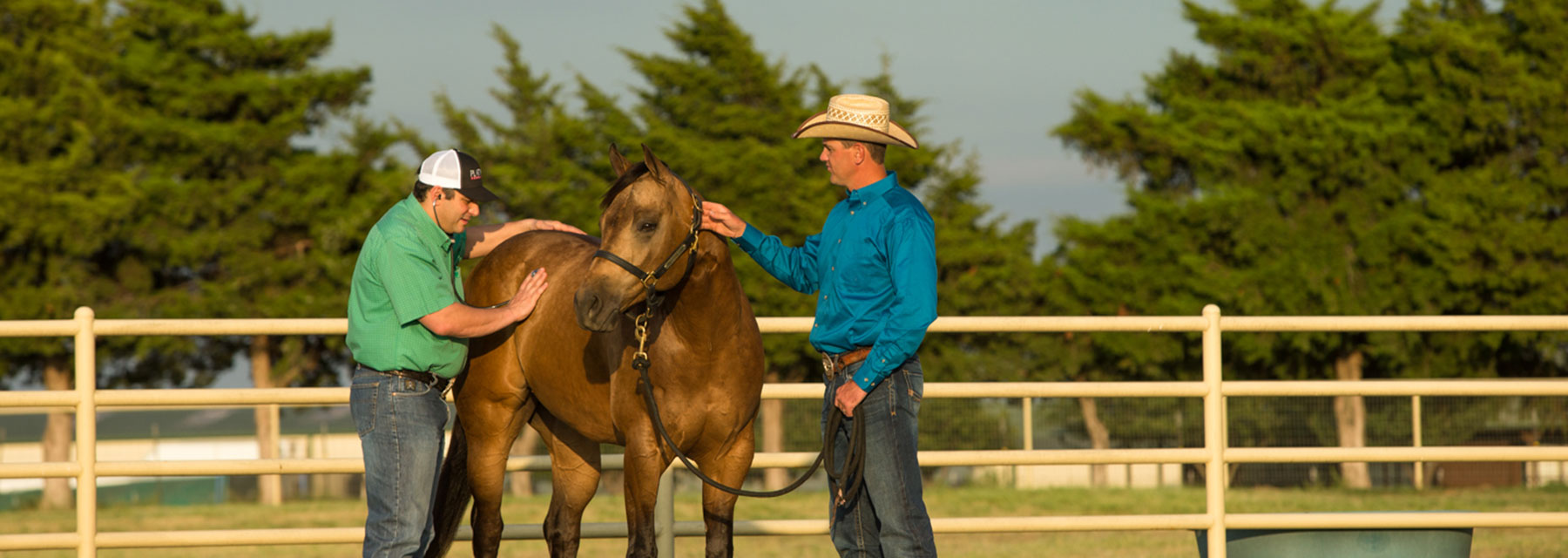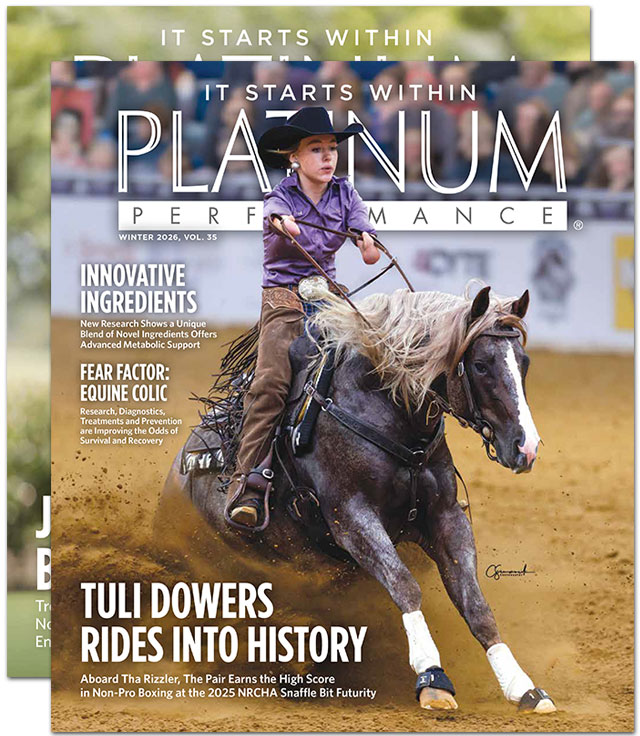Acting Colicky?
Colic in horses is scary. Behind old age, colic is the number two cause of death in horses. Colic is not actually a disease itself, but a symptom of something amiss inside the horse that is causing abdominal upset and pain. Signs to watch for can include restlessness, pawing, sweating, an increased respiratory rate, looking back at the flank, stretching as if to urinate, little or no passing of manure, lack of appetite, tacky gums, attempting to roll or rolling, sometimes violently, and an elevated pulse rate.
While there are many types of colic and many different risk factors associated with each type, the majority are correlated to nutrition and the general diet. Learn about the top 10 management tips that can help prevent colic from occurring.

1. The Perfection of Pasture
Pasture is nature’s perfect food for horses and is the single most important thing to prevent digestive issues and avoid colic. The fact is that horses on full turnout colic less than horses that are not allowed to graze in a natural setting. Clayton Smith, DVM, of Brazos Valley Equine Hospitals, says, “My clients that are able to keep their horses out on pasture 24-7 simply do not have the amount of colic issues as those with boarded horses because of the increase in gut motility that goes hand-in-hand with pasture grazing. There’s a lot of different causes for colicking horses, but straight to the top of the list is a lack of pasture and turnout time.” Grazing on pasture is the most natural way for horses to eat. Pasture grass is full of vitamins, minerals, fiber and naturally hydrated to move digesta through the gastrointestinal tract and an ideal rate of passage.
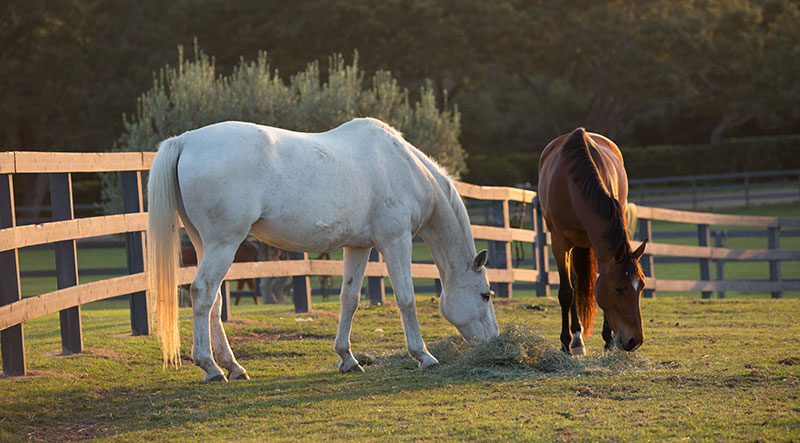
2. Hay: The Next Best Thing
Emulate a natural grazing diet as much as possible. Grass is best, but hay is next in importance in the equine diet, and most important for those without access or without consistent access to pasture. A forage source of either pasture or hay should be available at all times to all horses. This is critical for gut integrity and motility. Replicating the slow trickle of high fiber feeds that horses are designed to ingest is one of the most important things to ensure in any feeding program for domesticated horses. Even horses that are overweight or easy keepers should have hay in front of them as much as management allows. If the horse eats hay too quickly or there is concern of feeding too many calories, put hay in a slow feeder. This allows for a consistent fiber source and slows down the consumption. Steady access to forage has a multitude of health benefits including being a way to prevent or manage gastric ulcers, extremely common in horses, especially those fed a high grain diet. The slow digestion of hay increases a buffering effect in the stomach of the horse. Consistent hay allows for consistent digestion, which the horse’s digestive system is designed to thrive on.
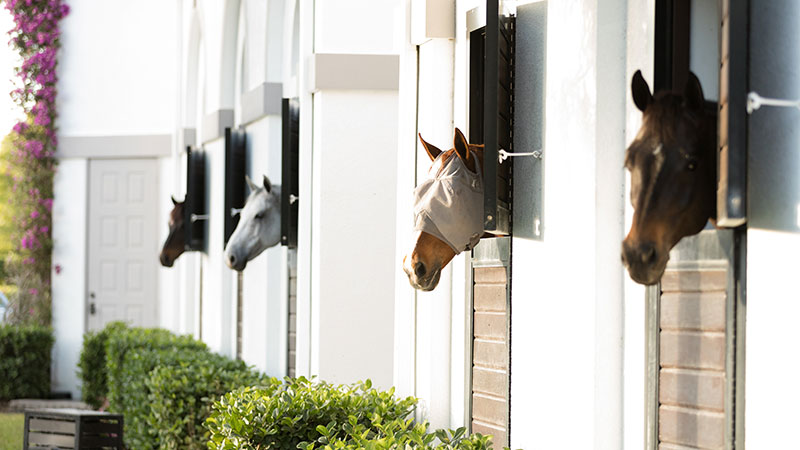
3. Mobility = Motility
Exercise is incredibly important for gastrointestinal health all the time and especially during cold winter months. Daily exercise and movement is needed for a properly functioning digestive tract. Horses were designed to move regularly throughout the day at low impact intervals. The healthiest way to support gut integrity is to set them up for the same evolutionary situation. Sometimes it simply is not possible for horses to be turned out all the time or as much as wanted. Any opportunity to allow the horse low impact movement is excellent for gut health. “For the barns that I visit where turnout is simply not possible and the horses spend the majority of time in stalls, a treadmill or other walking device is the difference between me coming out to treat horses for colic and not. Some facilities balk at the idea because it’s expensive equipment, and it is, but so is colic surgery,” says Smith. Of course, not everyone can have an equine treadmill! But stall confinement is a causative factor for colic simply because the horse is designed to walk around, and a stall limits that. Any way to get your horse out is beneficial for gut motility. Ride, take him for a walk, hand graze, turn him out in an indoor arena or a round pen for a little while, let him walk on a lunge line. Any low impact movement that the horse does is working muscles, including the intestinal muscles, which will keep things moving normally within.

4. Feed Grain in Moderation, or Don’t Feed It at All
Feeding grains is a risk factor for colic. Feeding too much in a single, meal setting is linked to carbohydrate overload and hindgut acidosis. Eating it too quickly can lead to impaction. Feeding old, rancid or tainted feed can contain various toxins that will cause digestive upset. Most types of colic are linked to grain consumption in one way or another because it is a flawed feed for horses. Most horses can maintain weight and meet nutrient requirements on a diet of quality forage, hay and pasture. Once forage is exhausted, for those that require supplemental grain to hold weight or to support exercise requirements, it is much healthier to break feedings into as many as possible and not to feed more than 4 lbs in a single serving. Smaller meals several times a day are a better way to feed grains and concentrates. By doing this, it allows the stomach and small intestine to fully digest the sugar and starch content of the meal and not allow any to pass into the hindgut. The issue with reaching the hindgut is that these specific carbohydrates are then fermented and change the delicate pH of the cecum, killing off critical microflora and disrupting the hindgut balance that is in charge of digesting the fiber content of the diet. Minimize grains and split them into as many feedings as is possible management-wise.
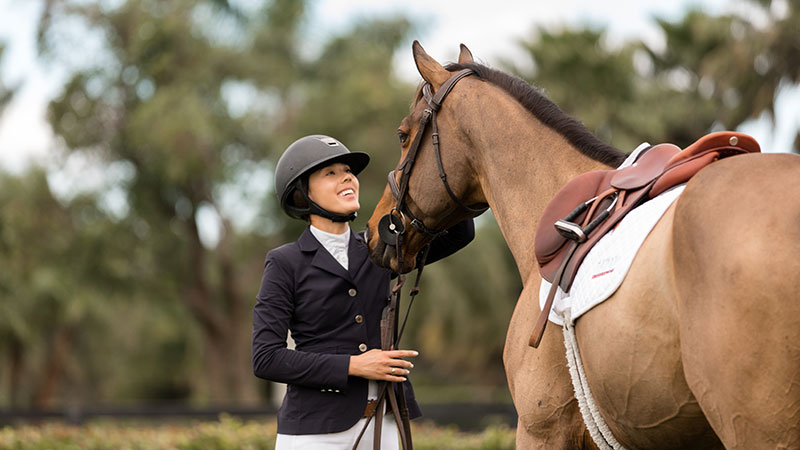
5. Make Changes Gradually
Horses are creatures of habit. They thrive on a consistent routine, and while they have been made to be flexible to trailer and take to new venues to ride, train and show, it is best to keep their routine as similar as possible day-to-day. This is definitely true for feeding routines. Feeding at the same time of day with the same quantity and types of hay and grains (if needed) is important. The hindgut of the horse has a delicate microflora population that thrives on consistency as well. Abrupt feeding changes can disrupt the balance and possibly kill off the important bacteria, fungi and protozoa that are in charge of digesting much of the fiber of the fiber-based animal. This can cause excess gas or motility problems associated with colic. Make changes gradually over 10-14 days. This is true for any new grains or concentrates, as well as new hay types, and even introducing new pastures. If shipping or moving a horse, try to send as much of his regular feed as possible with him to allow him a chance to acclimate to new feeds. Dr. Smith notes, “I work mainly with show horses who are on the road really the majority of the time. We take for granted how delicate the horse’s digestive system is, and don’t think about it until there’s an issue, usually as a colic. Trying to keep their nutrition program as close to regular and on schedule as possible is really important when they’ve got the stress of trailering and showing and new environments on top of everything else. Bring the hay that they’re used to eating, even at longer shows, and switch over to something else slowly if you have to. Call ahead and make sure they have the brand of feed available so you don’t run out and switch to feed something new last minute. Use Platinum Performance GI® or a probiotic. Spend the money on omeprazole. Anything that you can do beforehand to keep their hindgut right is worth it to prevent a colicking horse.”

6. Healthy Hydration
Water intake and GI hydration are necessary for normal gut motility. This is another reason that pasture is such a great food for horses. Because of the high water content in grass, it naturally hydrates, lubricates and pushes food through the digestive tract. As hay is basically dehydrated grass, horses will consume much more water on hay-only diets. A general rule of thumb is that that horses consuming 20 to 25 lbs of hay daily will require at least 8 to 12 gallons of water for normal, healthy digestion. When horses do not have access to drinkable water, they can easily become dehydrated, a common cause of colic. Research shows that horses without access to water for as little one to two hours have an increased risk of colic. Fresh, clean water should be available at all times. Hang an extra bucket for a stalled horse in case one gets dirty or emptied. Clean outdoor horse tanks regularly. Consider water heaters for the cold winter months when horses tend to drink less and are more at risk for impactions. Adding salt to feeds can increase the desire to drink, or make mashes with your horse’s regular feed by adding warm water to it in cold months.

7. Salt
Salt satisfies sodium and chloride requirements, which is very limited in the natural equine diet, and it is also a powerful thirst stimulant. Making sure that a plain white salt block is always available for horses that live both inside and out, will most likely satisfy salt needs. Place salt blocks or loose salt under cover outside so precipitation does not wash it away. If a block does not seem to be utilized, add 2 tablespoons of table salt per day to a horse’s feed in ambient conditions to satisfy requirements and encourage drinking. More salt or an electrolyte supplement may be necessary in hot, humid conditions or whenever the horse is sweating above maintenance. Hydrated horses are less likely to colic.

8. The Importance of Annual Wellness Exams
An annual wellness physical is recommended for all horses. Research shows preventive veterinary care can improve a horse’s long-term wellness and influence the rate of serious medical conditions such as colic. A veterinarian needs to do physicals and will most likely take the horse’s vitals, check body condition, give seasonal vaccinations, do a dental exam and take a fecal sample in order to administer the most relevant deworming protocol. This general husbandry practice done on a yearly basis reduces the risk of colic in several ways. Poor dentition can result in partially masticated forage, which can impact the digestive tract. If not dewormed at recurrent intervals, the chances are high that the horse will be prone to parasite infestation. If he does have parasites and is dewormed, killing off a heavy load of worms could result in colic. It is best to leave it in the capable hands of the overseeing veterinarian. Several types of parasites can cause impactions leading to colic. Regular deworming helps to prevent this. The veterinarian will also be able to check general health and is more likely to catch many equine diseases at an early stage.
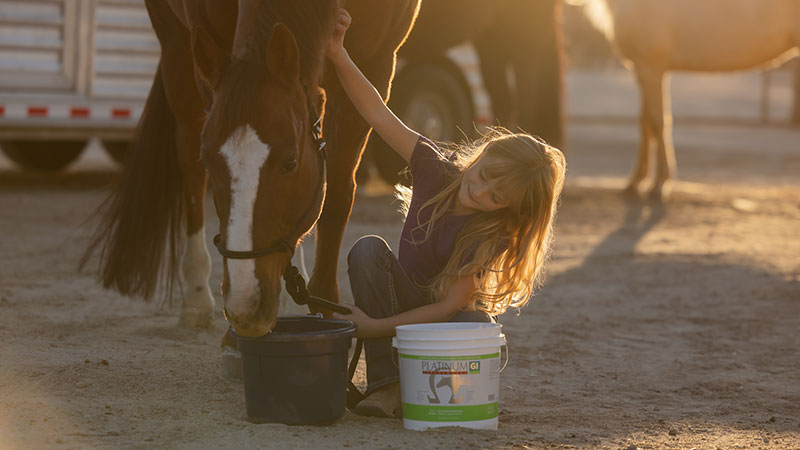
9. Supplements for Colic Prone Horses
Probiotics are a way to optimize the health of the digestive tract and are recommended for many situations: traveling horses, horses on high grain diets, senior horses, horses that are more sensitive to stress. Health benefits of both pre- and probiotics are well-documented within the intestinal tract and include increased nutrient digestibility and feed efficiency improvements. This is significant for all horses, but certainly for horses prone to colic episodes. Saccharomyces cerevisiae is a yeast species that optimizes starch and fiber utilization. Supplementation with S. cerevisiae may limit the detrimental effects of a decreased pH of the cecum and colon and increased concentrations of lactic acid commonly seen with today’s high starch feeding practices. Another probiotic strain, Saccharomyces boulardii, offers immune and anti-pathogenic advantages. S. boulardii prevents adherence of pathogens to intestinal cell walls and can neutralize common toxins in the GI tract. Glutamine is a very important amino acid to intestinal health. It maintains healthy intestinal cells, reduces the permeability of the gastrointestinal tract to pathogens and improves the immune response at the level of the intestinal cell. As an antioxidant, it provides defense against elevated levels of free radical and oxidative stress and stimulates intestinal cell growth. These are all beneficial nutrients to support general digestive integrity and can all be found in Platinum Performance® GI, Platinum Performance® DJ and Platinum Balance®. Dr. Smith recommends Platinum GI for colic prone horses. “At every one of my barns, there’s 1 or 2 horses that are just naturally more sensitive and more likely to colic. Those are the ones that I always strongly recommend go on a comprehensive wellness formula that contains probiotics like Platinum GI. It really helps to keep their gut calm and acclimates the bacteria in the hindgut so they can deal with small changes in their diet or stressful situations much better.”
Anxiety and stressful situations can lead horses to go off feed and disrupt routine. This empties the GI tract, increases gastric acid and decreases general motility which can encourage a colic situation. A calming supplement that contains magnesium citrate and L-theanine, like Platinum Gentle®, can be a useful tool for helping horses through a temporary stressful situation such as leaving a buddy, getting on the trailer, acclimating to a new environment, etc.
Psyllium can be a helpful supplement for cases of sand colic, which is caused by the ingestion of sand or dirt, typically occurring over a period of time and can lead to a compaction in the colon. Psyllium can help to clear sand from the intestinal tract and normalize gut motility. Consider feeding horses with a barrier between the feed and ground such as on a rubber mat or use elevated feeders so the horses are eating off the ground to avoid ingesting sand with their feed.
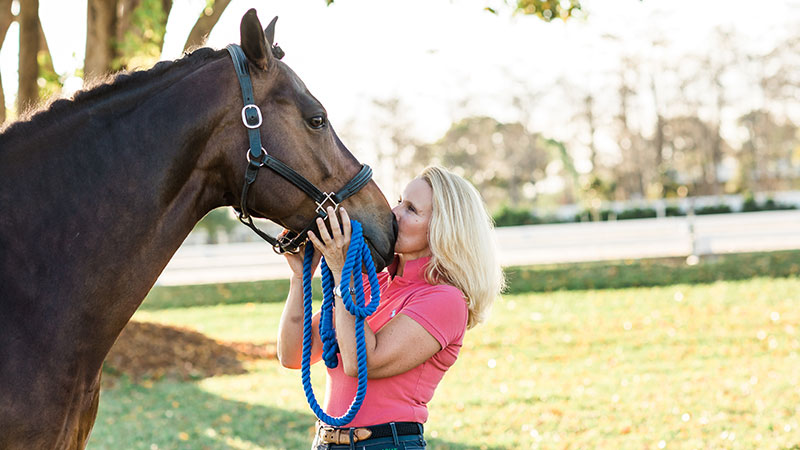
10. Know Normal
Being prepared and knowing what is normal for an individual horse and what is not can be critical when faced with a colic episode. Being able to take a horse’s vital signs, if you can do it safely, is valuable information. The normal temperature range for an adult horse is 99.5-101.5°F. The normal respiratory rate is 12-20 breaths per minute. Have a stethoscope on hand to take a pulse; normal range is 30-42 beats per minute. Under the horse’s lip, the gums should be moist and pink. If they are tacky or red and take longer than 2 seconds to refill when pushed with a finger, that is not normal. If anything seems abnormal, call the veterinarian. As is the case for most vets, Dr. Smith has seen plenty of colics of all different etiologies. “What helps the most when a horse is showing signs of colic and time is critical, is having an owner that is capable of telling me the severity of the situation before I am able to get there and evaluate the horse in person. Being able to take a temperature, evaluate the respiratory rate and pulse, check mucous membranes and listen for gut sounds, lets me know a whole lot about the situation. Have there been any changes to their routine? Have any medications been given? Being able to do a simple physical and answer general questions allows me to know if I can treat the horse medically, or if he needs to get loaded on a trailer to go to the hospital immediately.”
There are many different factors that are related to colic in horses, and even ones that are probably still unknown. Some of the most common causes are a lack of pasture turnout, hay restriction, large, high starch meals, dehydration, poor dental health and environmental stress.
Byproducts of these common factors include gastric ulcers, intestinal impactions, excess gas production and changes in the hindgut pH all of which can lead to abdominal pain and colic. Many colic cases are directly linked to the equine diet and can be avoided with proper nutrition and an understanding and respect for the natural digestive wonder of the horse.

by Emily Smith, MS,
Platinum Performance®
